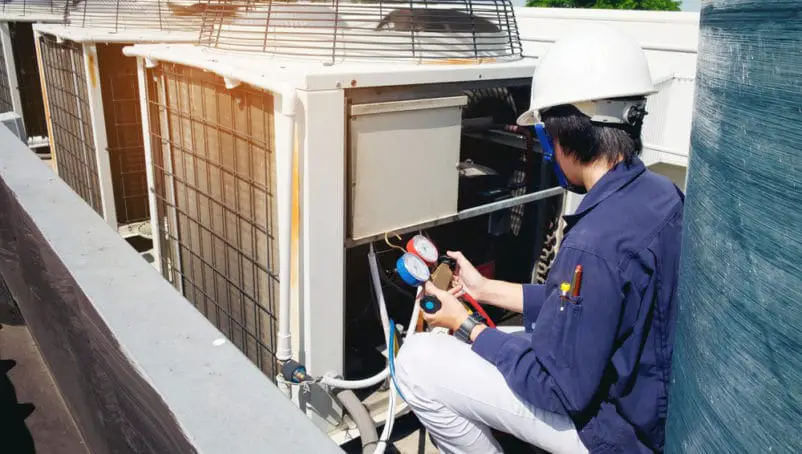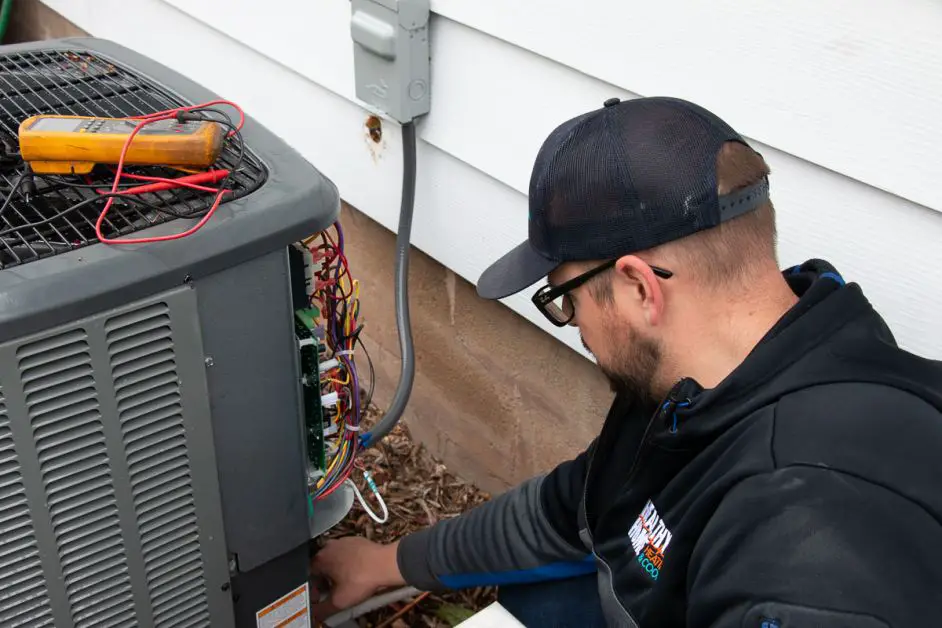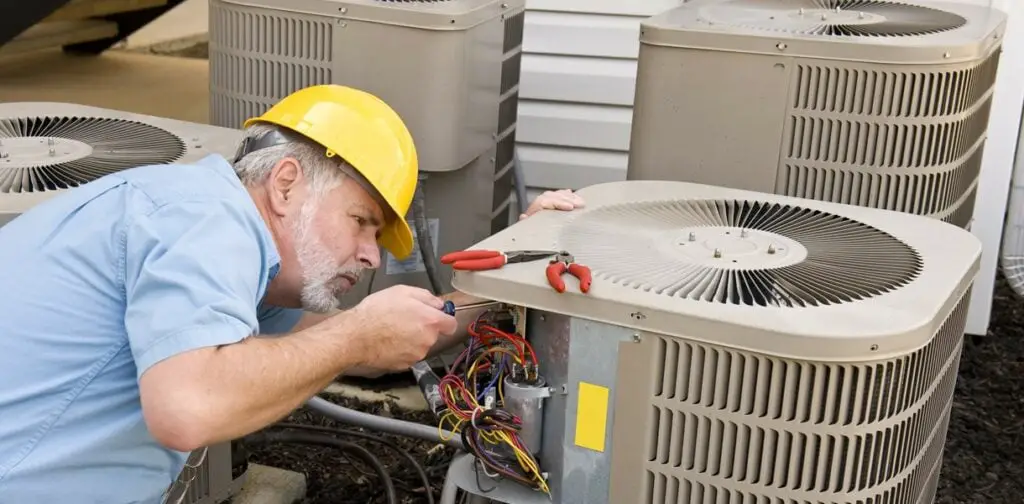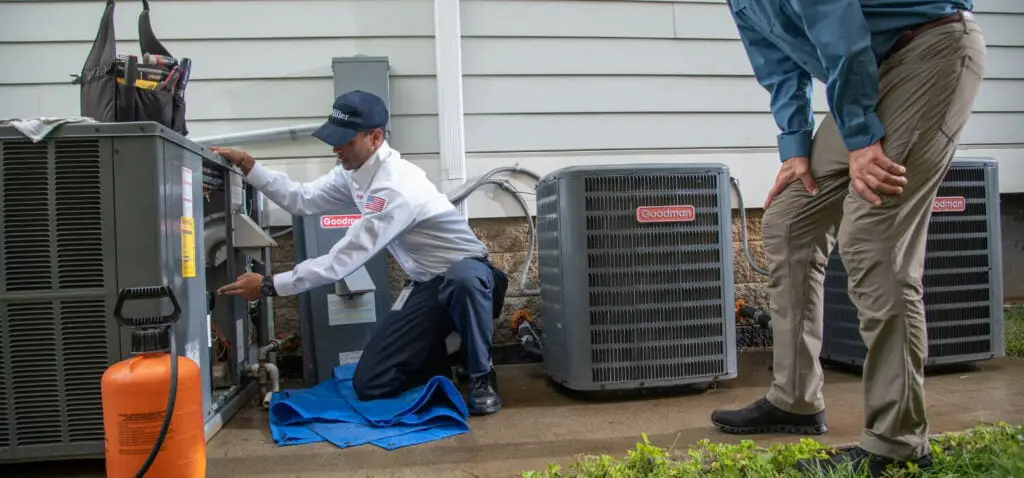Becoming an HVAC service technician or contractor is a career option on the rise in Tennessee. With the hot summer temperatures and cold winter freezes, conditioned air is not a luxury; it is a necessity! Installing new equipment or maintaining and repairing existing central heating and air units is big business all across the nation, and it is especially true in Tennessee.
If you are looking for a career that lends itself to becoming an entrepreneur and being your own boss, look no further than the HVAC industry. This is a lucrative lifelong opportunity for the self-starter and mechanically inclined person to build a brand and a reputable business as a contractor.

How to Become an HVAC Worker in Tennessee
To become an HVAC tech, you do not have to attend a formal college or vocational school in Tennessee. If you are more inclined and interested in mechanical work and need hands-on experience, you can go for an apprenticeship and gain training.
The advantage of an apprenticeship is that you pget hands-on training while earning a paycheck.
- In Tennessee, you will be working as a contractor. You must appear for and also clear the HVAC industry trade exam to become a qualified candidate.
- If you are entirely a beginner, you might need to study and read books and other materials about the basic principles of cooling and heating. These books can also teach you about repair and maintenance practices, so you can move forward in your career and get more options for yourself.
- To qualify as a contractor in the HVAC industry, you will have to appear for a formal trade exam. Another additional exam is conducted that covers business laws in Tennessee.
- The exam that assesses your knowledge about business law makes sure that you are equipped to run a successful business following the Tennessee law. The second test is the HVAC examination.
- While serving as an apprentice, you can obtain study guides and prepare yourself for a licensing exam if you are not in school. The state requires HVAC students or apprentices to pass two exams.

Why Tennessee is a Great Place to Start an HVAC Career
When it comes down to an HVAC career, Tennessee is a great place to start. The reason behind this includes the following:
Promising Job Opportunity
The US Bureau of Labor Statistics suggests the job growth in this field to be at 14%. As HVAC is becoming more complex, it has started to create plenty of job opportunities for people who know how to fix, install, and maintain modern and advanced systems.
The employment Tennessee for HVAC mechanics and installers has increased to 8.7% along with 2.768 employment per 1000 jobs. This has made Tennessee a great place to start your career in this field.
Good Salary
The BLS suggests that the mean annual wage for workers in Tennessee is $51,390. Generous overtime pay allows plenty of HVAC workers to earn extra bucks when the temperature reaches the extreme.
Minimal Requirements
There are not many complicated requirements regarding the HVAC business in Tennessee, which makes it a great career opportunity. It is easy for entry-level workers to make their way into managerial, higher-ranked positions without further formal studies.
Requirements For Becoming an HVAC Tech in Tennessee
To get a license in Tennessee, you will need to first apply for a Tennessee HVAC/Refrigeration program. You will have to work under a professional and expert HVAC technician to complete the program and then apply for the license. After passing two exams, you will receive your license.

The prerequisites for the HVAC program includes the following:
- You must have a Tennessee driver’s license or ID card
- It requires a GED or a high school diploma
- You need to take a general aptitude placement test
- Be at least 18 years old
- You must be physically capable of carrying out HVAC work
You also require on-the-job experience. These include the following:
- You should know the Tennessee HVAC codes
- Perform refrigeration and HVAC work according to safety regulations
- Make sure you know how to use blueprints
- Perform math calculations on various HVAC jobs
- You need to work at least around 40 hours per week
- Install and maintain HVAC systems under a contractor who has an eligible license
Furthermore, there are two exams you need to give, and you need to pass both of them with a 73% score. The exam has 100 questions and a 260-minute time limit, and you need to be prepared for it.
Licensure Procedures
Becoming an HVAC technician does not require you to attend formal vocational trade school or college. It is one of the vocations that you can test drive as an apprentice. If you find that you are mechanically inclined and like doing the work, you can follow through with an apprenticeship and obtain on-the-job training by learning from a journeyman. In Tennessee’s system, this means that you’ll be working with a licensed HVAC contractor.
The HVAC technician must take and pass the HVAC industry trade exam to be the qualifying agent for a contractor. If you follow the career path of an apprentice, you will want to read and study books about the principles of heating and cooling and about repair practices so that you can advance your career and give yourself more options.
To be the qualifying agent for an HVAC contractor, you must take a trade exam and an additional exam that covers business and law in Tennessee. The business law exam ensures that you are knowledgeable in running a successful business within the guidelines of Tennessee state law.
EPA Requirements

The Environmental Protection Agency requires HVAC technicians who work with refrigerants to be properly trained in their handling and recovery. There is also documentation that must be accurately notated about the refrigerants. The EPA coursework teaches all of this.
EPA certification is available in tiers. Type I, Type II, and Type III are for varying equipment types based on the type of pressure that the refrigerant used in the refrigeration equipment is under.
There are different kinds of refrigerants also. The universal licensure covers all types of equipment and refrigerants. This licensure is recommended so that you are able to handle any refrigerant. However, if you specialize in a particular equipment type, one of the individual tier licenses is appropriate.
Without the EPA certification, HVAC technicians are unable to purchase, charge, or recover refrigerants. This certification is transferable from one state to another because it is a federal certification. It has no expiration date.
Examination Process
PSI Exams Online is the exam administrator of the Tennessee testing process. You must verify your work experience and provide information about your employer in your application to sit for the exam.
Examination sites include Chattanooga, Jackson, Johnson City, Knoxville, Memphis, and Nashville. You should arrive at least a half hour before the test is scheduled to begin for check in. If you are late, you will not be allowed to sit for the exam, and tardiness causes you to forfeit your registration fee of $57 for the trade exam and $57 for the business and law exam.
The computerized exam includes a tutorial to familiarize you with the exam style and how to select and review your answers. The Business and Law Management Examination is an open book exam composed of 50 questions with 140 minutes allotted for completion. This exam covers such topics as the tax laws, contracts, risk management, and environmental safety.
The trade exam covers the HVAC industry’s best practices and specialized trade knowledge. This also is an open book exam. The exam includes questions about such topics as load calculations, heating and cooling principles, and refrigerants as well as electrical knowledge, ducts, and piping. If you acquire the necessary reference materials, you may familiarize yourself with them before the test date. Check out our practice tests for more test prep.

The Tennessee Board for Licensing Contractors is in charge of the licensure process for HVAC contractor licenses.
A financial statement must be provided that has been prepared by a CPA. The business will own the license rather than the qualifying agent, unless the qualifying agent is the business owner.
A complete application includes the financial statement, proof of General Liability insurance and Workers’ Compensation, and references, exam scores, and a $250 application fee. After your application is received, there is a possibility that you will be called in for an interview, but many times this is waived.
If you are licensed in certain other states, be aware that reciprocity only exists for accepting the trade exam results in states that border Tennessee. That means you’ll still have to fulfill the other requirements.
Licenses are good for two years. You’ll be reminded about three months ahead of your expiration, and it’s recommended that you renew at least one month before expiration to avoid bidding with an expired license. If you miss the date, you can renew within twelve months without further requirements, but you cannot work legally until the license is renewed.
Job Outlook and Salary for HVAC in Tennessee
For those looking to join the HVAC industry and work as a professional in Tennessee, you will have an average pay of around $42,000. Tennessee is one of the best places to work as a technician in the industry, particularly in terms of the financial benefits and wage rates.
The starting salary is usually very high, as technicians tend to start at around $27,000 per year.
With more qualifications and experience, techs can get higher wages as well. Top earners can get an income of $62,000 per year. Senior-level technicians can earn more than that.
HVAC engineers, on the other hand, get to earn an average salary of $85,780 in Tennessee per year, and this is the 27th highest-ranking state in the US. Senior mechanical engineers tend to earn salaries of up to $102,000 a year, which makes the salary and job outlook much better in Tennessee than anywhere else.
How Much Does an HVAC Installer Make in Tennessee?
Let’s learn how much an entry-level, mid-level, and professional make per year in the HVAC field.
- Entry-Level: $16.43 per hour
- Mid-Level: $22.83 per hour
- Master-Level: $35.36 per hour

Tennessee Cities With Highest Average HVAC Salaries
The best Tennessee cities to work in with the highest average salaries include the following:
- Nashville: $21.37 per hour
- Memphis: $19.85 per hour
- Maryville: $19.01 per hour
- Chattanooga: $18.17 per hour
- Clarksville: $16.99 per hour
Even though all are part of the same state, some cities have different licensing requirements for HVAC installers and technicians. For example, in Chattanooga, professionals must have at least three years of experience as registered helpers and have completed 2000 hours in HVAC metal installations. They also need to apply and pass for a journeyman mechanic examination.
Similarly, Knoxville requires four years of experience and needs to complete an application for a mechanical license. They also need a contractor’s bond of at least $10,000.
Thus, you must also know the different requirements required by the city you plan to start your career in.
What an HVAC Contractor is Allowed to Do
An HVAC contractor in Tennessee must obtain a Tennessee Mechanical HVAC/Refrigeration Contractor License if you are planning to work on a commercial HVAC/R system that exceeds $25,000. It doesn’t necessarily have to be the owner who takes the exam for the license. A qualifying agent could also include an officer if it’s a corporation or a full-time employee.
Before obtaining a contract or bidding on a contract that exceeds $25,000, you must be licensed as a contractor.
HVAC contractors are knowledgeable of heating and cooling principles and theory as well as heating and cooling equipment. The HVAC contractor holds the dual role of businessman and HVAC journeyman. Contractors are required to know how to figure load calculations as well as safety measures and fire prevention.

This license permits a license holder to perform any work related to ventilation or ductwork in new construction or replacing existing ductwork. It also permits a person to install, maintain, or replace any heating unit or air conditioning unit or appliances that involve refrigeration or heating elements. Gas pipelines for furnaces or appliances may also be installed, maintained, or repaired.
This license does not permit a person to perform electrical work. Since that is a key part of any modern HVAC system, pursuing the electrical contractor license is also key.
HVAC technicians who work as an employee of a contractor are not required to be licensed, so long as the contractor is licensed in HVAC. Contractors are responsible for overseeing the project in its entirety.
Contractors are required to obtain liability insurance for all projectors they work on.
What is Required To Obtain a Tennessee HVAC Contractor’s License?
To receive an HVAC contractor license in Tennessee, you need to follow a few guidelines. The license is for the Tennessee HVAC/Refrigeration Contractor (CMC-C). It allows the company to perform and install air conditioning, heating, ventilation, piping, and fitting for gas equipment, and geothermal equipment.
To acquire this, you need to follow these steps:
Pass the Official State Exams
This is a test that shows what the applicant knows and if they know what they are doing when it comes to air conditioning, ventilation, heating, and refrigeration.
It has around 100 questions and a four-hour time limit. It covers all HVAC knowledge, including codebooks for gas, electrical, and mechanical work. You need 73% on the test to pass, and if you fail three times, you will have an interview with the board before taking the test again.
Pass the Tennessee Law and Business Exam
· Submit an official application to the Tennessee board review and financial statements from the company that is signed and reviewed by a Certified Public Accountant.
· The applicant must submit a letter of recommendation from a previous inspector or client. The board will set a monetary limit based on the company’s cash on hand or working capital (whichever amount is less).
In addition to the steps mentioned above, any contractor with one or more employee needs to have the Worker’s Compensation insurance. Each applicant has to show a genuine certificate that declares their insurance.

How to Get an HVAC Certification Online in TN
HVAC certification requires physical learning, and for that, you will need to join an institution in Tennessee. You cannot get online certification and will need to attend a university. Some good institutes in the state are:
- Vatterott College – Dividend
- Remington College – Memphis
- Tennessee College Of Applied Technology
- Fortis Institution
Conclusion
A promising career path in Tennessee is the path to becoming an HVAC service technician or contractor.
HVAC contractors have the potential to bid on projects worth more than $25,000. If you are a motivated self-starter who enjoys working on mechanical equipment, the HVAC industry is a path you should explore.
People Also Ask
Even with all the information present above, people can get confused. To help you get rid of this confusion, we have answered some queries below.
It can take you anywhere from six months to two years, depending on your chosen program and how much experience you have beforehand.
To get your HVAC class B license, you need to fulfill the requirements mentioned above and take the two tests. You must also have experience as an HVAC apprentice.
Looking For Information On Nearby States?
You might also be interested in HVAC licensing requirements in bordering states:

Comments are closed.